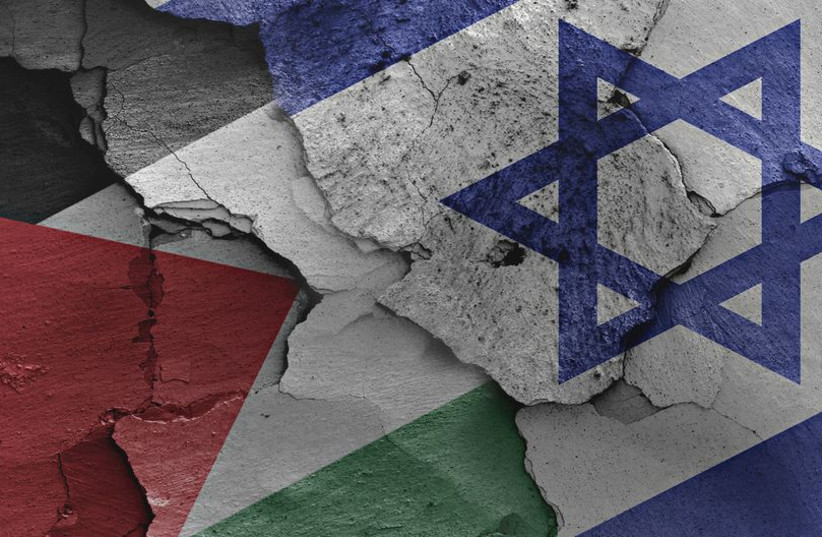There is a way out of the Israeli-Palestinian conflict - opinion

The historical pain, the legacy burdens and the traumas here run so very deep that no amount of rocks or weapons can ever fully express it.
There’s a scene in the film Forrest Gump where Jenny furiously throws several rocks at the house where her father had abused her. Shattering the window, she breaks down sobbing. Forrest, who is standing next to her, says with his unique wisdom, “Sometimes there are just not enough rocks.” In other words, when the pain is so deep, no amount of angrily hurled rocks can ever fully express it.
Here in Israel and Palestine, these words have resonated strongly with me over the past months amid yet another series of acts of violence and revenge. At the beginning of February 2023, my organization, Together Beyond Words (TBW), held a seven-day training session on Healing for Peace for Israeli, Palestinian, Arab and Jewish group leaders and social activists.
Toward the end of the week, one of the Palestinians received a message that a good friend of his was killed by the Israeli military in Nablus. Sharing this news, he showed us a photo of his friend’s smiling face next to a beautiful tree. A few days later, one of my Jewish clients told me that the two Jewish brothers killed by a terrorist in the violence at Huwara in late February were members of her family. Again, I saw the beautiful faces of victims smiling at me on the internet news.
Historical pain, legacy burdens and traumas run deep
The historical pain, the legacy burdens and the traumas here run so very deep that no amount of rocks or weapons – of which we have more than enough – can ever fully express it. If we tried, we would destroy one another completely.
And yet, I am hopeful that there is a way out of the pain that has locked Israelis and Palestinians in perpetual conflict. In my 28 years of work helping Israeli and Palestinian individuals find peace together, I have seen that when we transform the pain and legacy burdens at the root of hostilities into empathy and understanding, a desire emerges to work together for change. It all begins with finding other ways to express their pain.
HERE IS an example:
One evening in November 2019, during a workshop TBW led with Israelis and Palestinians, there was a moment when each participant seemed stuck in their own marshland of sadness, grief and anger. Communication and human connection broke down. Our leader, the founder and director of the Radical Aliveness Institute, suggested that we sit in a circle around a candle and simply feel what was each of ours to feel.
Tears began to flow. A few people screamed angry words and one person sobbed. A woman banged her hands against a large pillow and cried “Enough!” so many times that I thought she would never stop. Another man looked at the people in the room and shouted loudly, “Why can’t you see us? Why can’t you recognize our pain?”
Without realizing it, we had formed a grief circle. Grief circles are an ancient nourishing space where, for thousands of years, people gather to connect with their sorrow, share stories and experience grief in a community. When our circle ended and people shared their experiences someone said, “It seemed like together we cried and screamed the pain that had been frozen in our bodies for too many years that we experienced fear and terror, anger and hatred, immense love, passion and yearning and such deep human connection. And we were able to see beyond all the stories, to truly see ourselves and one another.” Looking around the room, I saw many people nodding, others hugging and a few sobbing in each other’s arms.
Feeling seen, heard and safe to express one’s pain such that others understand it, each and every day I experience the impact this can make on communities stuck in conflict: Jewish people understanding and acknowledging how Palestinians are suffering and Palestinians understanding the same about Jews. When understanding sets in, a wall melts in our hearts and – just as it happened that day in 2019 – we can see ourselves in others’ shoes.
It is possible. I have seen it time and again in such spaces – safe havens where we can listen, express and transform the pain. From there, we can find our way back to dialogue and connection.
The writer is the author of Together Beyond Words: Women on a Quest for Peace in the Middle East. A therapist, she is co-founder of the nonprofit organization Together Beyond Words (TBW), an organization that brings Muslim, Jewish, Bedouin, Druze and Christian women and more recently men together in a process to heal ancient wounds and promote emotional understanding.
Learn more about the Radical Aliveness organization: https://radicalaliveness.org/.
Jerusalem Post Store
`; document.getElementById("linkPremium").innerHTML = cont; var divWithLink = document.getElementById("premium-link"); if (divWithLink !== null && divWithLink !== 'undefined') { divWithLink.style.border = "solid 1px #cb0f3e"; divWithLink.style.textAlign = "center"; divWithLink.style.marginBottom = "15px"; divWithLink.style.marginTop = "15px"; divWithLink.style.width = "100%"; divWithLink.style.backgroundColor = "#122952"; divWithLink.style.color = "#ffffff"; divWithLink.style.lineHeight = "1.5"; } } (function (v, i) { });

